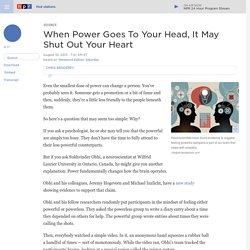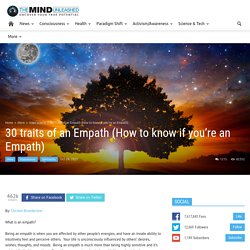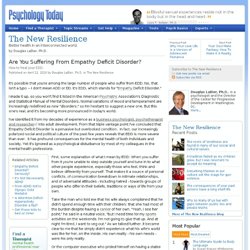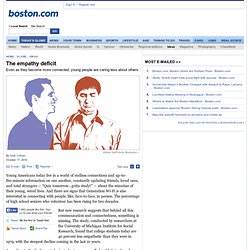

RSA Animate - The Empathic Civilisation. RSA Shorts - The Power of Empathy. When Power Goes To Your Head, It May Shut Out Your Heart. Neuroscientists have found evidence to suggest feeling powerful dampens a part of our brain that helps with empathy.

Vladgrin/istockphoto.com hide caption toggle caption Vladgrin/istockphoto.com Neuroscientists have found evidence to suggest feeling powerful dampens a part of our brain that helps with empathy. Vladgrin/istockphoto.com Even the smallest dose of power can change a person. So here's a question that may seem too simple: Why? If you ask a psychologist, he or she may tell you that the powerful are simply too busy. But if you ask Sukhvinder Obhi, a neuroscientist at Wilfrid Laurier University in Ontario, Canada, he might give you another explanation: Power fundamentally changes how the brain operates. Obhi and his colleagues, Jeremy Hogeveen and Michael Inzlicht, have a new study showing evidence to support that claim. Obhi and his fellow researchers randomly put participants in the mindset of feeling either powerful or powerless.
Then, everybody watched a simple video. Six Habits of Highly Empathic People. If you think you’re hearing the word “empathy” everywhere, you’re right.

It’s now on the lips of scientists and business leaders, education experts and political activists. 30 traits of an Empath (How to know if you're an Empath) By: Christel Broederlow What is an empath?

Being an empath is when you are affected by other people’s energies, and have an innate ability to intuitively feel and perceive others. Your life is unconsciously influenced by others’ desires, wishes, thoughts, and moods. Being an empath is much more than being highly sensitive and it’s not just limited to emotions. Empaths can perceive physical sensitivities and spiritual urges, as well as just knowing the motivations and intentions of other people. Empaths are often quiet achievers. However, they can be the exact opposite: reclusive and apparently unresponsive at the best of times. Empaths have a tendency to openly feel what is outside of them more so than what is inside of them. Empaths are more inclined to pick up another’s feelings and project it back without realizing its origin in the first place. Empaths are sensitive to TV, videos, movies, news and broadcasts. Here are the listeners of life. Why Do We "Otherize?"
Are You Suffering From Empathy Deficit Disorder? It's possible that you're among the large number of people who suffer from EDD.

No, that isn't a typo -- I don't mean ADD or ED. It's EDD, which stands for " Empathy Deficit Disorder. " I made it up, so you won't find it listed in the American Psychiatric Association's Diagnostic and Statistical Manual of Mental Disorders. Empathy Library. Empathy Circles - Lidewij Niezink, PhD. Empathy Circles: Building a Culture of Empathy In 2012 I joined forces with Edwin Rutsch of the Center for Building a Culture of Empathy and Compassion.

Edwin is building an Empathy Movement and together we have developed Empathy Circles as a hands-on instrument in building a culture of empathy. Most materials are available through this site. The Moral Molecule. Zero Degrees of Empathy. Empathic people are natural targets for sociopaths - protect yourself. © Fotolia Olly The empathy trap: therapists and counselors almost by definition are empathic, to facilitate clients' recovery - but this quality can mean those carers are targets for sociopaths, aided by what Dr Jane & Tim McGregor call "apaths".

The first UK article on this cruel sport shows how to identify and thus avoid it. People targeted by a sociopath often respond with self-deprecating comments like "I was stupid", "what was I thinking" of "I should've listened to my gut instinct". But being involved with a sociopath is like being brainwashed. The sociopath's superficial charm is usually the means by which s/he conditions people. On initial contact, a sociopath will often test other people's empathy, so questions geared towards discovering if you are highly empathic or not should ring alarm bells.
Sociopaths make up 25% of the prison population, committing over twice as many aggressive acts as other criminals. But not all sociopaths are found in prison. Everyday sociopaths. The empathy deficit. Young Americans today live in a world of endless connections and up-to-the-minute information on one another, constantly updating friends, loved ones, and total strangers — “Quiz tomorrow...gotta study!”

— about the minutiae of their young, wired lives. And there are signs that Generation Wi-Fi is also interested in connecting with people, like, face-to-face, in person. The percentage of high school seniors who volunteer has been rising for two decades. But new research suggests that behind all this communication and connectedness, something is missing. The study, conducted by researchers at the University of Michigan Institute for Social Research, found that college students today are 40 percent less empathetic than they were in 1979, with the steepest decline coming in the last 10 years. According to the findings, today’s students are generally less likely to describe themselves as “soft-hearted” or to have “tender, concerned feelings” for others. Such studies have obvious flaws.